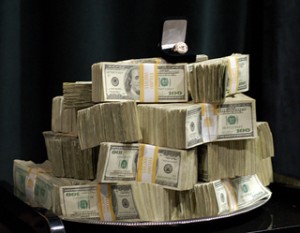 “OK. Well I just hope I can sell this to the Lithuanian,” the voice on the phone concluded.
“OK. Well I just hope I can sell this to the Lithuanian,” the voice on the phone concluded.
I had just finished negotiating my contract to cover the 2008 World Series of Poker. It hadn’t gone as well as I had hoped. I got more than they initially offered, but not quite as much as I got paid in 2007. And I was pissed.
I was probably more pissed at myself than I was at PokerNews. During the negotiation, it was obvious to me that both I — and my client — lacked leverage. And I was pissed because I knew this day was coming.
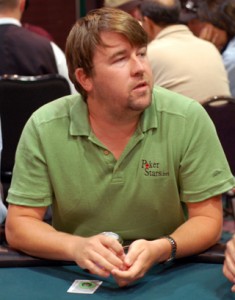 I flashed back to 2006 in the food court of the Gold Strike Casino in Tunica, Mississippi. “We’re so fucked,” I belted out to the Shrink.
I flashed back to 2006 in the food court of the Gold Strike Casino in Tunica, Mississippi. “We’re so fucked,” I belted out to the Shrink.
It was late and the food court was as lackluster as any. But it was one of the only places you could find wireless in the whole Tunica gambling metropolis. It was September 29th and the Shrink and I were posting the latest final table results from the Grand’s WSOP Circuit event.
I tend to surf as I write, which is how I discovered Bill Frist had just tacked the Unlawful Internet Gambling Enforcement Act (UIGEA) onto must-pass legislation one day before Congress was set to adjourn for the 2006 elections. Frist didn’t particularly give a shit about the UIGEA. But Frist had a presidential campaign to orchestrate and the UIGEA was Jim Leach’s pet project. Doing a favor for the representative of Iowa (host site of the first presidential caucus) was a no-brainer, even for a halfwit like Frist.
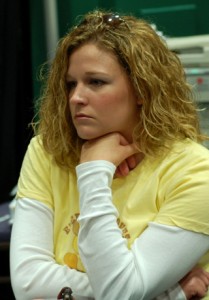 It’s almost ironic that Leach got voted out of Congress and Frist’s presidential bid was abysmal — leaving the UIGEA as the ploy’s only survivor.
It’s almost ironic that Leach got voted out of Congress and Frist’s presidential bid was abysmal — leaving the UIGEA as the ploy’s only survivor.
In 2006, almost every poker magazine and website was raking in unspeakable ad and affiliate revenues from online poker sites. They say content is king. But it’s no better than a serf without ad revenue. And as I sat there in the food court, a scene from the movie The Right Stuff popped into my head.
Gordon Cooper: You boys know what makes this bird go up? Funding makes this bird go up.
Gus Grissom: He’s right. No bucks, no Buck Rogers.
But it wasn’t as bad for poker journalism’s Buck Rogerses as I imagined in the Gold Strike food court — at least initially. And I began to wonder if I had overreacted.
Publicly traded online gambling companies left the US, taking their ad revenue with them. But the companies that remained grew stronger and ad money continued to flow — albeit with a reduced stream. I banked a nice roll covering the 2007 WSOP.
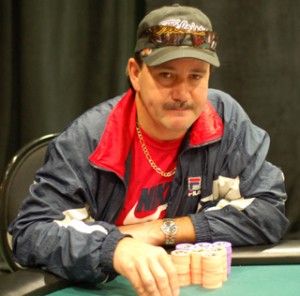 By the time my 2008 WSOP contract negotiations came up, poker’s print media had suffered some casualties. A few weaker magazines had folded and stronger magazines had begun to slash pages. But PokerNews had many non-US websites, and seemed to be weathering the UIGEA-triggered shit storm well. I was freelancing about 20-25 articles a month to them. And they often asked for more.
By the time my 2008 WSOP contract negotiations came up, poker’s print media had suffered some casualties. A few weaker magazines had folded and stronger magazines had begun to slash pages. But PokerNews had many non-US websites, and seemed to be weathering the UIGEA-triggered shit storm well. I was freelancing about 20-25 articles a month to them. And they often asked for more.
But the minute PokerNews started playing hardball for the series coverage, I knew they hadn’t weathered it all that well. If they were struggling, the rest of the industry was struggling more. And with the economy about to hit the fan, the last thing I wanted to be was a freelance journalist for a vulnerable industry.
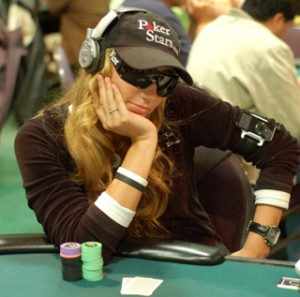 The next morning, I woke up at 5:00 am and started to search job listings. I had been an investment writer before the poker boom and enjoyed it – and often thought of returning to that world. Within 20 minutes, I found an investment writing job in Austin. Within 2 hours, I had applied for the job. Within two weeks, I called PokerNews and told them I had taken a new job — my first day job in 12 years.
The next morning, I woke up at 5:00 am and started to search job listings. I had been an investment writer before the poker boom and enjoyed it – and often thought of returning to that world. Within 20 minutes, I found an investment writing job in Austin. Within 2 hours, I had applied for the job. Within two weeks, I called PokerNews and told them I had taken a new job — my first day job in 12 years.
The market and economy tanked. I had a day job with benefits in a growing company.
Many of my poker writing colleagues have since lost their jobs. I would have been one of them. The day that PokerNews lowballed me to cover the 2008 WSOP, they saved me from the same fate.
Dedicated to John Caldwell, my unwitting savior.
Photo Notes: Pictures I took at the 2006 Grand Tunica World Series of Poker-Circuit – Chris Moneymaker, Angel Word, Glyn “Ratchet” Banks, and Vanessa Rousso
4 Comments